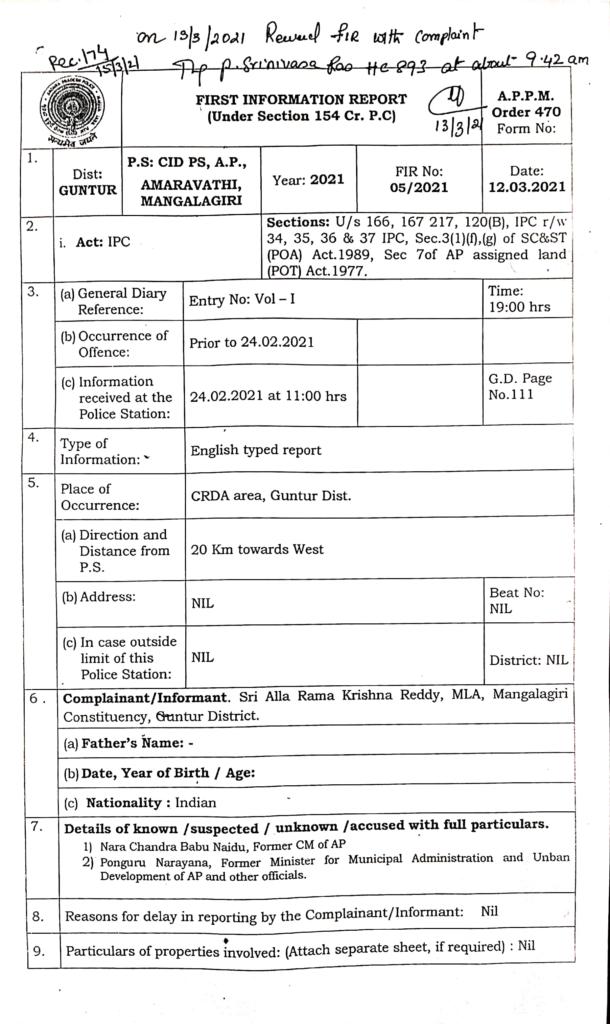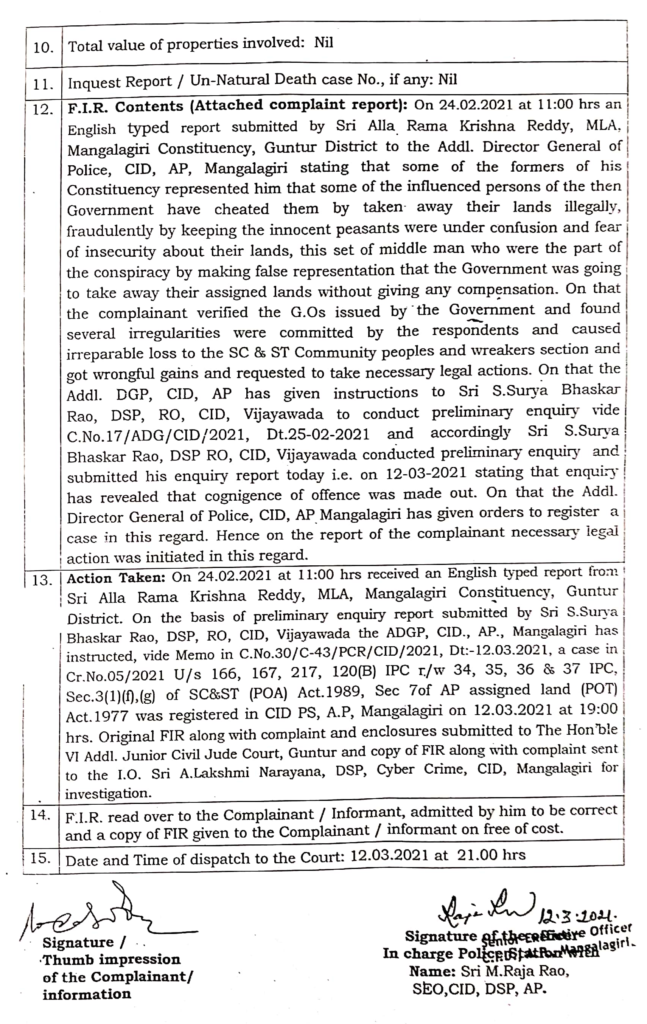Pre-arrest notice under Section 41A of CRPC to Chandrababu Naidu has caused serious sensation in two Telugu states today (Tuesday). On the charges of alleged forcing of SC ST persons to surrender assigned lands etc, the CID wing of Andhra Pradesh Police reached residence of former Chief Minister and TDP President Chandrababu Naidu this morning to hand over a notice of appearance. Former Chief Minister is now under obligation to attend to answer the questions by the CID investigating officers on scheduled day.
Case against Naidu
The complaint has formed the basis of FIR against Former CM Chandra Babu Naidu and former Minister for Municipal Administration and Urban development Ponguru Narayana and other unmentioned officials.
The FIR contains: A case under Section 166, 167, 217, 120 (b) IPC read with SS 34, 35, 36 & 37 IPC Section 3(1)(f)(g) of SC and ST (PoA) Act 1989, Sec 7 of AP assigned land (POT) Act 1977 registered on 12th March 2021 at Police Station CID Amaravati, Mangalagiri, Guntur. The contents of FIR noted are: ON 24th February 2021 at 11.00 hours Alla Ramakrishna Reddy, MLA of Mangalagiri Constituency, stated that some farmers represented to him that some of the influenced persons of the then Government have cheated them by taking away their lands illegally, fraudulently by keeping the innocent peasants under confusion and fear of insecurity about their lands. This set of middlemen who were the part of the conspiracy by making false representation that the Government was going to take away their assigned lands without giving any compensation. On that complainant verified the GOS issued by the Government and found several irregularities were committed by the respondents causing irreparable loss to the SC and ST community people and weaker sections and got wrongful gains and requested to take necessary legal actions. On that the Addl DGP CID AP gave instructions to S Surya Bhaskar Rao DSP RO CID Vijayawada to conduct preliminary enquiry and based on which report was submitted on 12th March 2021 stating that inquiry revealed a cognisable offence was made out. A case was registered, and necessary legal action was initiated, the FIR says. Non-appearance of Naidu might lead to arrest for the sake of further ‘inquiry’ into the allegation.

What is Notice of appearance
Section 41A notice of appearance is a step before the arrest which may help avoiding arrest of a person. This provision has been inserted by way of reforming the law of curtailing personal liberty to enhance and ensure the life and liberty of persons under Article 21. It will also prevent the abuse of arresting power at the hands of the executive or police. After several judgements of Supreme Court and High Courts and advocacy of jurists against abuse of the arresting powers, these provisions are incorporated into Code of Criminal Procedure, which is a very key legislation to protect the life and liberty of falsely charged persons. This major reform of law of arrest was initiated in 2009 and further amended in 2010.
Section 41A was added by the Code of Criminal Procedure (Amendment) Act, 2008 (5 of 2009). However, recently after the enactment of this Amendment, representations were received by the Union Government. Thus, some specific amendments were brought in by the Code of Criminal Procedure (Amendment) Act, 2010 (41 of 2010).
The earlier sub-section (1) of Section 41A read: The police officer may, in all cases where the arrest of a person is not required under the provisions of sub-section (1) of section 41, issue a notice directing the person against whom a reasonable complaint has been made, or credible information has been received, or a reasonable suspicion exists that he has committed a cognizable offence, to appear before him or at such other place as may be specified in the notice.
Also Read: Is there any workable procedure to complain against judges?


Power of arrest and limitations
In this section expression ‘may’ allowed arbitrary arrest by authorities. As ‘may’ always include ‘may not’, in law, a further reform was felt necessary and in 2010 the ‘may’ was replaced by ‘shall’. A proviso to section 41(1)(b)(ii) was also added which provided for recording of reasons for not arresting an accused. However, the Supreme Court desired in Arnesh Kumar (https://indiankanoon.org/doc/2982624/) case that notice of appearance under Section 41A should thoughtfully implemented. The Judiciary wanted to ensure that a police officer does not arrest any accused unnecessarily, and the Magistrate does not authorize detention casually and mechanically. The Supreme Court further directed as follows to avoid the arbitrary arrests:
- All the State Governments instruct its police officers not to automatically arrest when a case under Section 498-A of the I.P.C. is registered but to satisfy themselves about the necessary details before that arrest under the parameters laid down above flowing from Section 41 of Cr. P.C.;
- All police officers must be given a checklist that contains specified sub-clauses under Section 41(1)(b)(ii) of Cr.P.C.;
- The police officer should forward the checklist duly filed and produce the reasons and materials which necessitated the arrest while taking the accused before the Magistrate for his further detention;
- The Magistrate while authorizing detention of the accused shall pursue the report produced by the police officer in terms aforesaid and only after recording their satisfaction, the Magistrate will authorize detention;
- The decision of not arresting an accused, must be forwarded to the Magistrate within two weeks from the date of the institution of the case with Police to the Magistrate which may be extended further by the Superintendent of Police of the district for the reasons to be recorded in writing;
- The Notice of appearance in terms of Section 41A of Cr. P.C. must be served on the accused within two weeks from the date of institution of the case, which may further be extended by the Superintendent of Police of the District for the reasons to be recorded in writing;
- A failure to comply with the directions aforesaid shall apart from rendering the police officers concerned liable for their departmental action; shall also be held liable for contempt of court, which is to be instituted before High Court having territorial jurisdiction.
- Authorizing detention without recording reasons as aforesaid by the judicial Magistrate concerned shall be liable for their departmental action by the High Court having territorial jurisdiction.
Without curtailing the power of arrest without a warrant of arrest in ‘serious’ cases, the courts and the amendments to Cr PC provided for certain norms and instructions to prevent instantaneous deprivation of personal liberty, which is very valuable for any person.
Also Read: AP Justice’s anguish on a major Constitutional conflict between Executive vs Judiciary
The SC Bench of Chandramauli Kr. Prasad, Pinaki Chandra Ghose, JJ in this 2014 case said: We are of the opinion that if the provisions of Section 41, Cr. PC which authorises the police officer to arrest an accused without an order from a Magistrate and without a warrant are scrupulously enforced, the wrong committed by the police officers intentionally or unwittingly would be reversed and the number of cases which come to the Court for grant of anticipatory bail will substantially reduce. We would like to emphasise that the practice of mechanically reproducing in the case diary all or most of the reasons contained in Section 41 Cr.PC for effecting arrest be discouraged and discontinued.
The police must satisfy before arresting which is necessary
• to prevent such person from committing any further offence; or
• for proper investigation of the case; or
• to prevent destruction or tampering with evidence by the accused; or
• to prevent such person from influencing the witnesses; or
• to ensure presence of the accused in the court.
Police must, in any case, record reasons for making, or not making the arrest in a particular case.
The text of Section 41A of the Code of Criminal Procedure, 1973
Notice of appearance before police officer. – (1) The police officer [shall], in all cases where the arrest of a person is not required under the provisions of sub-section (1) of section 41, issue a notice directing the person against whom a reasonable complaint has been made, or credible information has been received, or a reasonable suspicion exists that he has committed a cognizable offence, to appear before him or at such other place as may be specified in the notice.( “shall’ in Clause 41A is Inserted by Code of Criminal Procedure Amendment act, 2008 and sub-clause (1) further modified by Code of Criminal Procedure Amendment act, 2010)
(2) Where such a notice is issued to any person, it shall be the duty of that person to comply with the terms of the notice.
(3) Where such person complies and continues to comply with the notice, he shall not be arrested in respect of the offence referred to in the notice unless, for reasons to be recorded, the police officer is of the opinion that he ought to be arrested.
(4) Where such person, at any time, fails to comply with the terms of the notice or is unwilling to identify himself, the police officer may, subject to such orders as may have been passed by a competent Court in this behalf, arrest him for the offence mentioned in the notice.” [This sub-clause (4) substituted by Code of Criminal Procedure Amendment act, 2010]
Also Read:More powers against and more restrictions on social media




